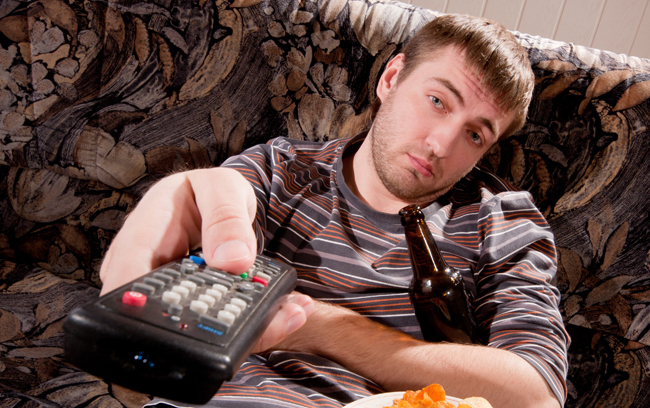
Hey, do you spend a lot of time by yourself in your darkened apartment binge-watching television shows on the Internet in an attempt to make yourself feel better about being super lonely and bummed out all the time? Well guess what… SURPRISE! YOU’RE DEPRESSED! UH, PROBABLY!
A new study by researchers at the University of Texas found that, yes, depressed people watch kind of a lot of television. And people with poor impulse-control are more likely to be unable to stop themselves from binge-watching. Presumably these findings will be released in the esteemed scientific publication The No Duh Quarterly.
The researchers conducted a survey on 316 18- to 29-year-olds on how often they watched TV; how often they had feelings of loneliness, depression and self-regulation deficiency; and finally on how often they binge-watched TV. They found that the more lonely and depressed the study participants were, the more likely they were to binge-watch TV, using this activity to move away from negative feelings.
The findings also showed that those who lacked the ability to control themselves were more likely to binge-watch. These viewers were unable to stop clicking “Next” even when they were aware that they had other tasks to complete. [EurekAlert]
Look, mental health is a serious issue, and if you’re sitting around watching Netflix 6-8 hours a day, every day, pounding through entire seasons of X-Files and The West Wing in under a week, often at the expense of important daily tasks like work projects or proper hygiene, then maybe you have a larger issue brewing that you should talk to a professional about.
But I think we may be starting to use “binge-watching” as a bogeyman here. Before Netflix, depressed people probably channel surfed for hours. And before television they probably did puzzles and read. And before that they probably sighed and stared at the fires in their caves. (I may be compressing the timeline a bit.) It’s not so much that binge-watching is bad as it is that depression is bad and a sedentary lifestyle filled with solitary, convenient time-wasters could be a symptom.
Look for more on this in my upcoming article in No Duh Quarterly, “Hey, Try To Stop Doing That So Much, Okay?”
Source: Smithsonian Mag






